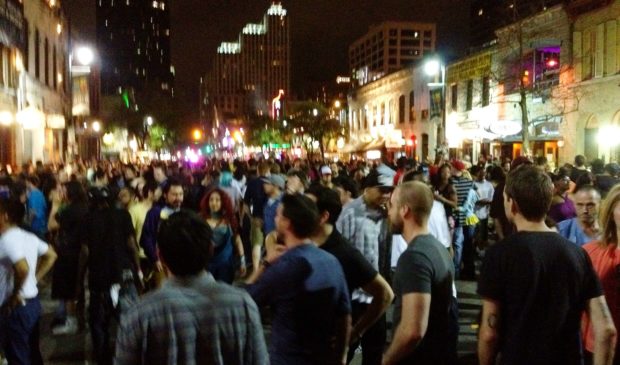SXSWTF? Dissecting a music festival’s immigration PR meltdown
Thursday, March 2, 2017 by
Chad Swiatecki In today’s installment of “A Good Rumor Travels Around the World Before the Truth Can Put On Its Shoes,” we watch with fascination as music fans from all over the world make South by Southwest out to be the newest arm of President Donald Trump’s anti-immigration fever dream.
The pebble to that avalanche was a Thursday afternoon Twitter rant from Brooklynite Felix Walworth, drummer for SXSW showcasing artist Emily Reo (among many other projects, including now-canceled festival act Told Slant) that called out a passage in SXSW’s artist contracts that foreign acts performing at the festival under the federal government’s visa waiver program can be subject to immigration penalties for actions that “affect the viability of their official SXSW showcase.”
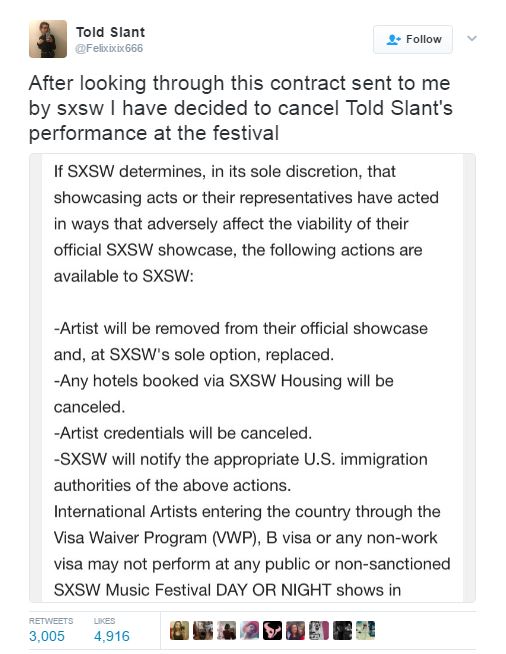
The then-small controversy was covered in fairly normal, workmanlike fashion by the Austin American-Statesman, with a response from the festival’s management about the intention behind that language. But the issue went Ice Bucket Challenge-level viral thanks to a post from the Onion’s A.V. Club that zeroed in on Walworth’s gripe about the contract’s prohibition of international acts playing unsanctioned shows (i.e., nothing but their official showcase), which are a financial necessity for most bands traveling to Austin to take part in SXSW. A headline that initially said the festival would outright deport offending bands was eventually softened.

From there, the A.V. Club’s always frothy comments section got to work weaving an artful tapestry of obscenity and outrage:
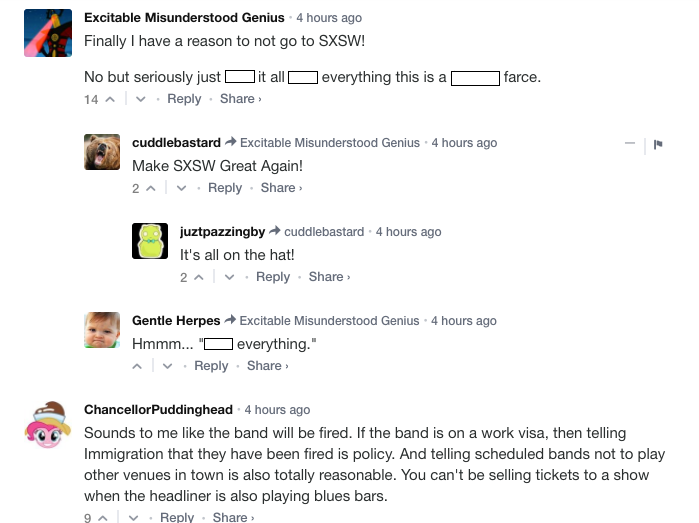
And blaming SXSW for quashing Austin’s weird, promoting gentrification, creating unending traffic gridlock and … you get the idea:
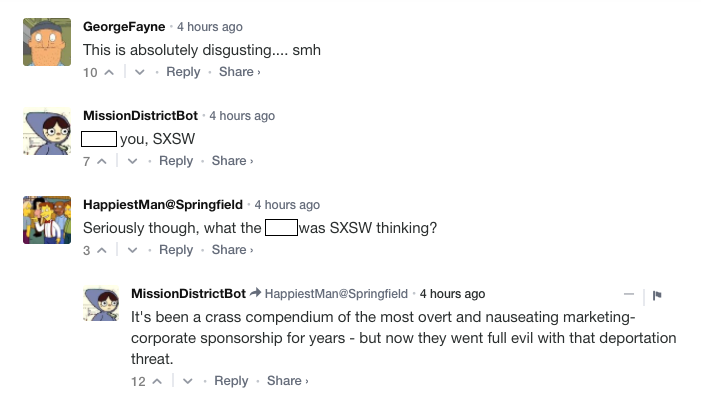
Things weren’t much better around the local social media ponds, where the festival that has done as much as any other single entity to turn Austin into a magnet for newcomers was being castigated for acting heavy-handed and adding to paranoia over the uptick in roundups of undocumented residents in Central Texas:

An interview from SXSW co-founder Roland Swenson with The Austin Chronicle later on Thursday was something of a mixed bag, offering some clarification of the issue but also incorrectly accusing (later corrected) Walworth of digitally doctoring the image that kicked off this digital symphony of outrage.
“What people don’t understand is that we’re already talking to immigration about all these bands. … Most of these bands are here because we sort of sponsored them.
“So if somebody did something bad enough that we had to enforce this part of the contract, we would probably be obliged to notify immigration that ‘Hey these guys are trouble,’ but we’ve never had to do that,” said Swenson.
Still, the matter has apparently rankled plenty of organizers of local unofficial shows featuring one or more international acts that could face harsh consequences if SXSW organizers opted to drop a dime on them. Cory Plump, until recently a longtime Austinite and a promoter of an unofficial show during the festival, shared details (but not the name) of a band he’s working with that fears what might happen if their non-SXSW performance gets publicized.
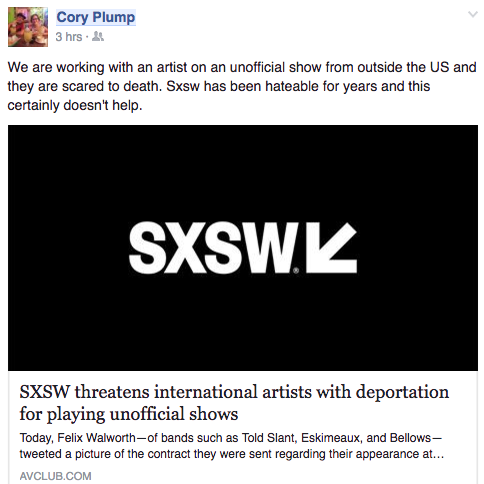
Plump elaborated later by email with the Austin Monitor:
“All I can say is I offered an unofficial daytime show to an artist from outside the US and they mentioned they could do it as long as we didn’t announce them or else they had been warned by sxsw that future visas into the US would be in doubt,” said Plump
In an emailed response to the Monitor, SXSW’s Swenson touched on the festival’s February statement against Trump’s travel ban on seven mostly Muslim countries, saying that the festival has never reported an international act to immigration authorities for violations outlined in the contract.
“It is, and always was intended to be, a safeguard to provide SXSW with a means to respond to an act that does something truly egregious, such as disobeying our rules about pyrotechnics on stage, starting a brawl in a club or causing serious safety issues.
“We hope never to be put in the position to act on this. Indeed, we spend a great deal of time communicating with international artists concerning numerous issues, including how to avoid issues at U.S. ports of entry,” said Swenson
The stickiest point of the whole issue is the visa waiver program that allows international artists to perform in the U.S. under very strict guidelines – most notably that they can’t work or engage in commerce for their own benefit without going through the lengthy and expensive process of obtaining a work visa that touring international musicians must have.
Some language from Artists From Abroad gives the basics (emphasis theirs):
“The general requirements for participation include no prior overstays in the U.S., and a prepaid round-trip ticket to a non-contiguous country within 90 days of arrival. Aliens entering under the Visa Waiver Program (VWP) are subject to the same rules as those admitted in B-1 or B-2 status – meaning they cannot work!”
And more, from the Chicago-based McEntee Law Group immigration law firm:
“Visits to the U.S. solely for promotional purpose (i.e. where no performance will be undertaken) may also be permitted under the B-1/2 visa or the Visa Waiver Program. As this is a gray area of the law, we recommend that you contact us so that we may prepare documentation for you in the event the immigration officer questions you regarding the purpose of your trip.”
One of the best local authorities on these matters is Dave Dart, the founder of Dart Music International, which has helped international acts visit and perform in the U.S. for more than a decade. As a result, Dart has been aware of the intricacies of the visa and immigration process in the U.S. for years and is well-versed in SXSW’s immigration-related language.
Reached by phone on Thursday afternoon, he was disappointed to learn that the festival had backed away from plans he’d heard about to loosen the language directed at international visitors.
“I thought I’d heard that they’d taken a look and tried to make it not sound so severe. I wish it didn’t sound so bad. The way immigration works is they’re not very nice to these guys. Many years ago (CIS) weren’t even looking for things to see if they were playing other gigs. These bands just want to come over, play music and further their career. They’re not doing anything wrong. The exemption that SXSW has (with immigration officials) actually works. They’ve gone to the State Department and customs and immigration services to work with them to be able to have some of these exemptions to qualify for the visa waiver program.” – Dave Dart
Dart said the biggest potential problems come from visa waiver bands that add other paying shows to their SXSW itinerary – which violates the waiver policy’s “no work” stipulation – and then get found out when immigration officials look them up when they try to cross the border and find a busy slate of shows that fall outside of what’s allowed.
“International bands will sometimes come here after they’ve booked the festival and then will book a bunch of other shows, and they put it up on their website. Over the last few years, there’s been stepped-up immigration, and these people will be at the airport and a customs agent will pull up their site and say, ‘It says here you’re playing a whole bunch of concerts, but your visa says you’re not. What’s going on?’ Bands have been turned away at the border, and then that leaves the festival in the lurch because they’ve set aside the stage time and resources for that band.” – Dart
While not directly contradicting Swenson’s claim that SXSW has never called the feds on bands that have violated the visa waiver allowances, Dart said that over the years there have been periods of increased scrutiny.
“For a while there was some fear of God for artists coming from Latin America that terrified everybody there. I haven’t heard that lately. There’s a way to be responsible about this, too. When I speak to a band from another country I try to explain to them all their options, and that if you come on the visa waiver program then you agree to come over in a very limited circumstance. You’re saying you’ll only come to play these narrow parameters, whereas if you come on a normal work visa then you can come and do a large tour, sell merchandise and do all that normal stuff. If you think you can get a career here, get a work visa –even though it’s more difficult and expensive – if it makes sense.” – Dart
With the festival a week away, there are now some clear lines drawn. It appears that as SXSW watches the actions of its international artists from 62 countries, so too will the world be watching the festival to make sure it acts as a proper and not overbearing host.
The Austin Monitor’s work is made possible by donations from the community. Though our reporting covers donors from time to time, we are careful to keep business and editorial efforts separate while maintaining transparency. A complete list of donors is available here, and our code of ethics is explained here.
Photo by Marlon Giles (Own work) [CC BY-SA 3.0], via Wikimedia Commons
You're a community leader
And we’re honored you look to us for serious, in-depth news. You know a strong community needs local and dedicated watchdog reporting. We’re here for you and that won’t change. Now will you take the powerful next step and support our nonprofit news organization?

